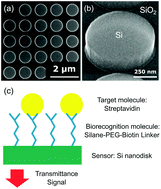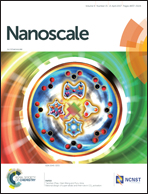Highly sensitive biosensors based on all-dielectric nanoresonators†
Abstract
Biosensing based on nanophotonic structures has shown a great potential for cost-efficient, high-speed and compact personal medical diagnostics. While plasmonic nanosensors offer high sensitivity, their intrinsically restricted resonance quality factors and strong heating due to metal absorption impose severe limitations on real life applications. Here, we demonstrate an all-dielectric sensing platform based on silicon nanodisks with strong optically-induced magnetic resonances, which are able to detect a concentration of streptavidin of as low as 10−10 M (mol L−1) or 5 ng mL−1, thus pushing the current detection limit by at least two orders of magnitudes. Our study suggests a new direction in biosensing based on bio-compatible, non-toxic, robust and low-loss dielectric nanoresonators with potential applications in medicine, including disease diagnosis and drug detection.



 Please wait while we load your content...
Please wait while we load your content...